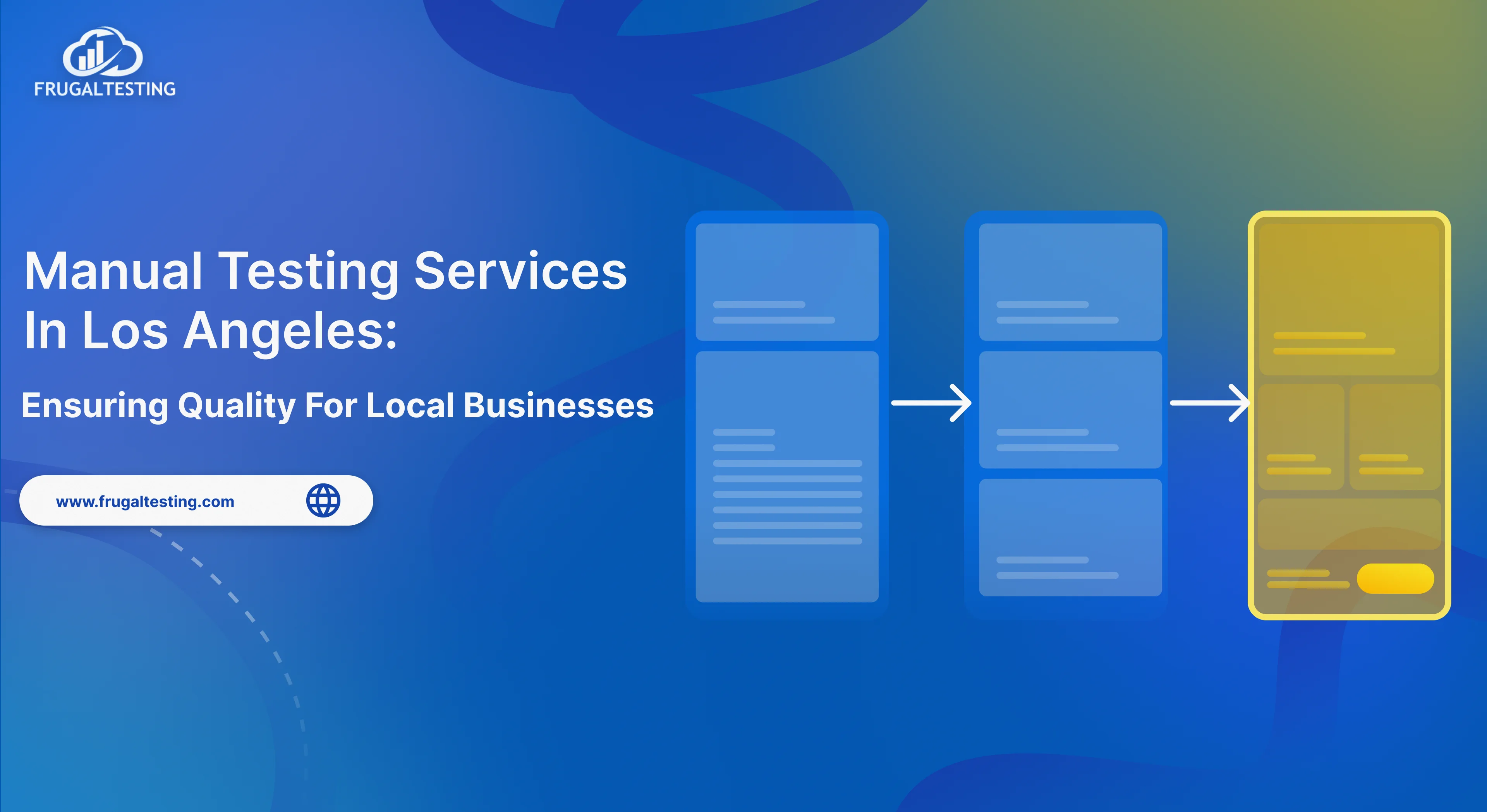In the rapidly evolving realm of software development and testing, AI testing is significantly reshaping how applications are tested and refined. By using artificial intelligence, AI testing enhances the efficiency of the software testing process. It allows for more adaptive, predictive, and insightful testing, enabling testers to pinpoint and resolve issues with greater speed and accuracy.
This blog will explore how cloud-based platforms are pivotal in democratizing AI testing, making these sophisticated advanced tools accessible to a broader range of users. These platforms are becoming a key factor in accelerating future development, enabling businesses to handle a wide range of testing scenarios with more precision and speed.
Key Insights✨
📌 Understanding AI Testing 🤔: Discover the fundamentals of AI testing and its transformative impact on software evaluation.
📌 How AI Improves Testing 📈: Learn how AI enhances the software testing process by increasing accuracy and efficiency.
📌 Cloud-Based Solutions ☁️: Understand the crucial role of cloud technologies in providing scalable and flexible environments for AI testing.
📌 Democratization of AI Testing 🌍: Explore how cloud-based tools make AI testing accessible to smaller businesses and individual developers, breaking down entry barriers.
📌 The Future of Cloud-Based AI Testing 🌐: Explore the emerging trends and innovations that will shape the landscape of AI testing.
Introduction to AI Testing
What is AI Testing?
AI testing refers to the use of artificial intelligence technologies to enhance and automate the software testing process. It involves integrating AI tools and techniques, such as machine learning and natural language processing, to improve various aspects of testing. This includes automating repetitive complex tasks, identifying patterns and anomalies, and predicting potential issues before they arise.
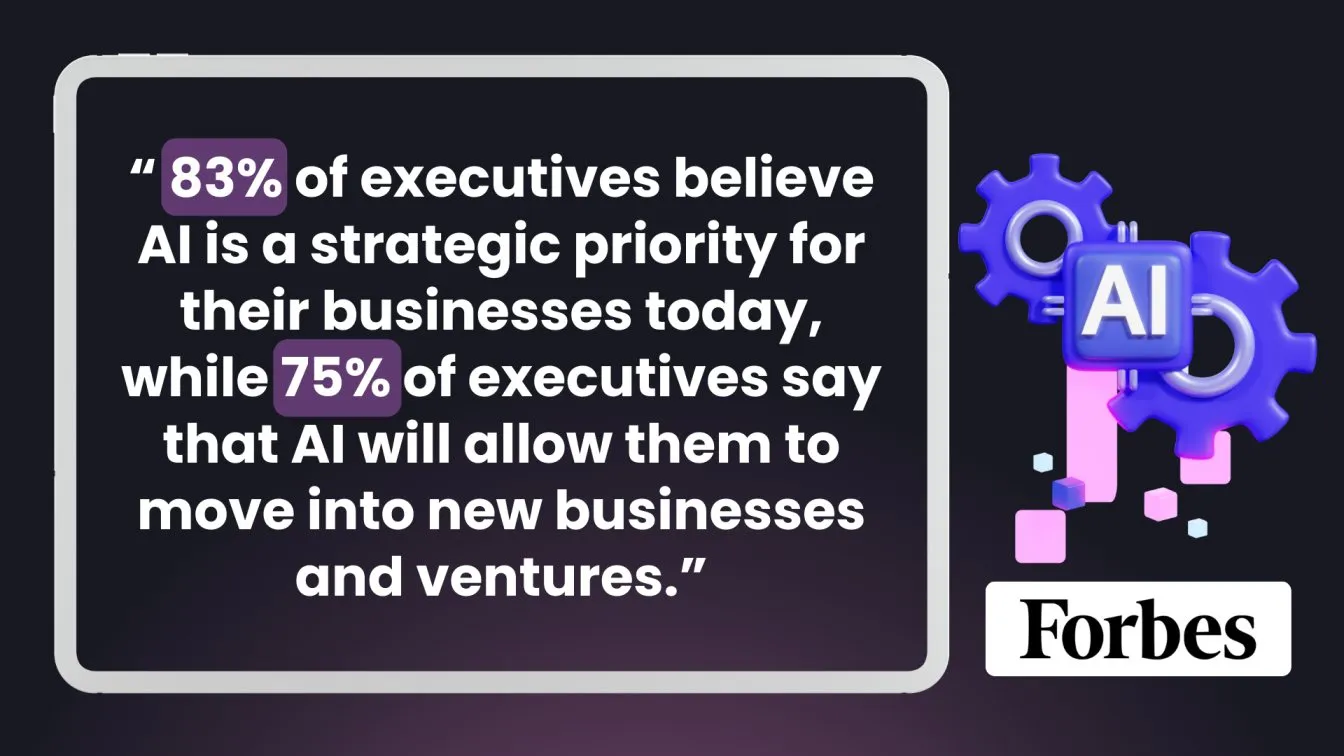
By leveraging AI, testing can become more efficient, adaptive, and insightful, providing a deeper understanding of software quality while complementing human capabilities and utilizing human language for better communication and collaboration.
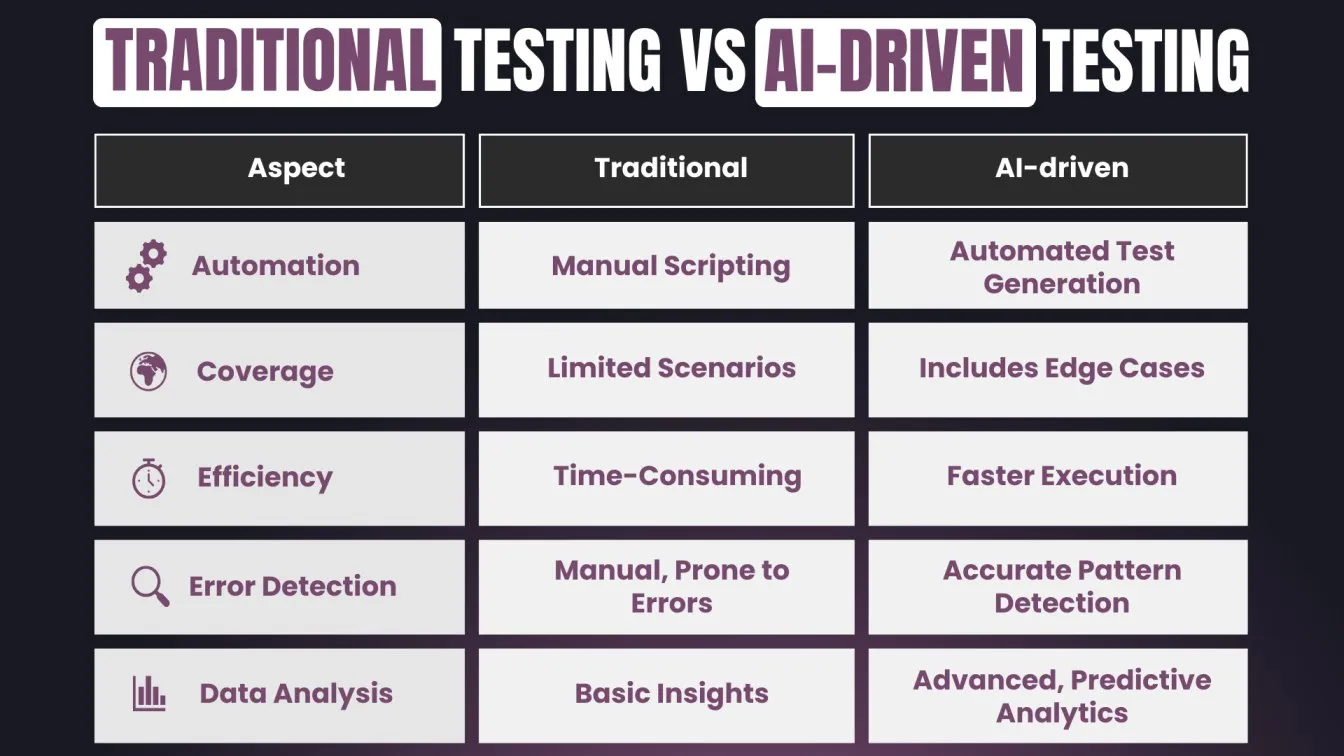
How AI Improves Software Testing?
AI is revolutionizing software testing by introducing advanced capabilities that enhance various aspects of the testing process. From automating routine tasks to providing predictive insights through model training, AI technologies enable testers to achieve greater efficiency, accuracy, and depth in their evaluations.
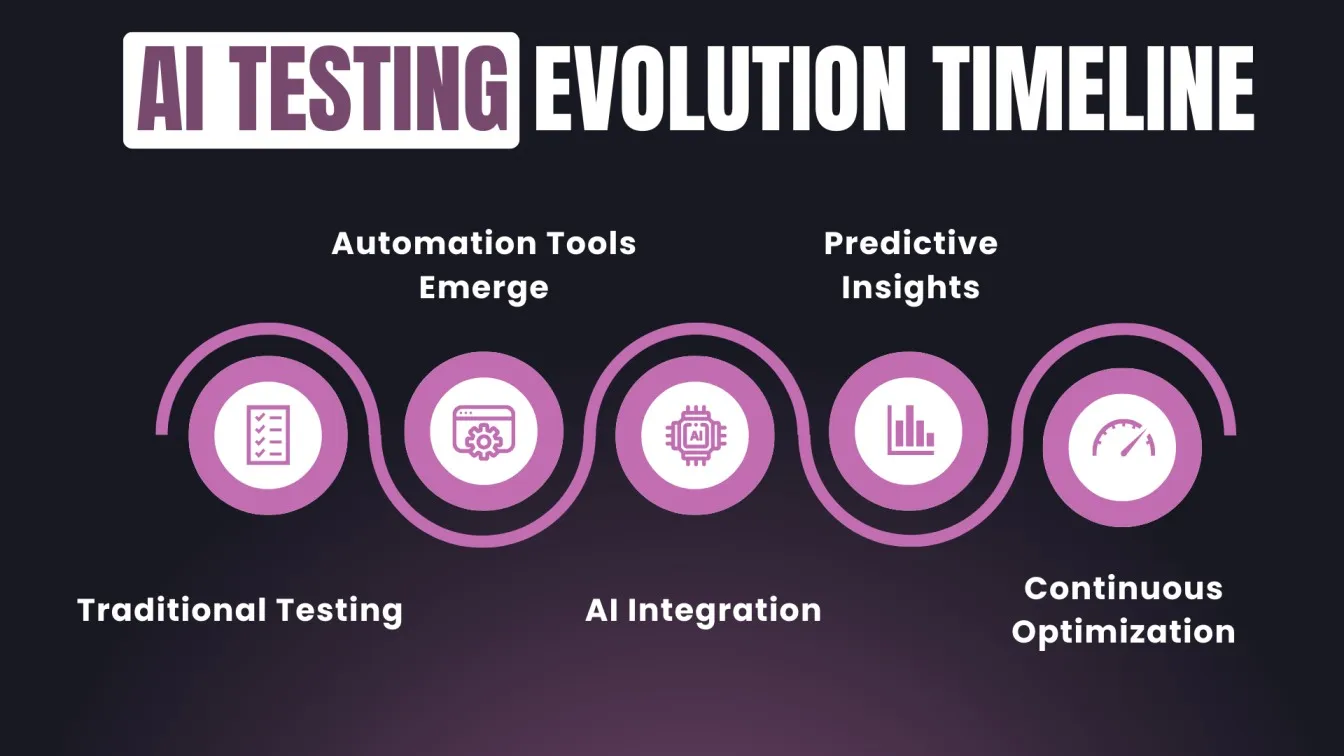
AI-driven testing tools not only streamline the testing process but also improve accuracy, helping teams identify potential issues early and adapt to changes in real time. Here’s how AI transforms the software testing process:
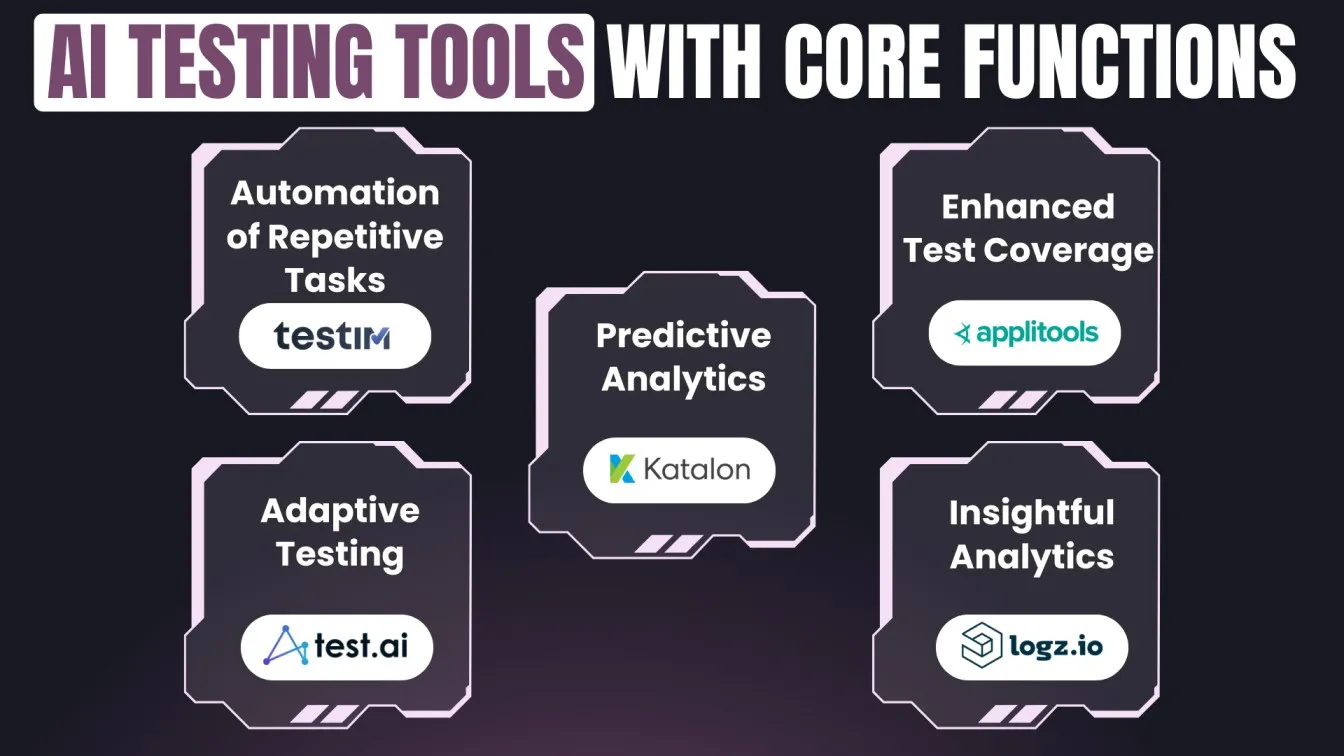
- Automation of Repetitive Tasks 🤖
Example: Testim leverages AI to automate the creation and execution of test cases. By handling routine tasks like test script generation and result analysis, Testim speeds up testing and reduces manual effort, minimizing human error. - Predictive Analytics 🔮
Example: Katalon Studio uses AI to analyze historical test data and predict which areas are likely to fail. This predictive capability allows testers to focus on high-risk components, addressing potential issues before they escalate. - Enhanced Test Coverage 🕵️♂️
Example: Applitools utilizes AI-powered visual testing to generate and execute a wider range of test scenarios, including edge cases. This broader coverage ensures that even rare or complex bugs are detected, providing more comprehensive results. - Adaptive Testing 🔄
Example: Test.ai adjusts its testing strategies based on real-time feedback and application changes. For instance, when a new feature is introduced, Test.ai dynamically modifies its testing approach to ensure thorough coverage. - Insightful Analytics 📊
Example: Logz.io employs AI-driven analytics to analyze error logs and test results, offering AI-driven insights into software behavior. This helps testers identify patterns and trends, enabling data-driven decisions to improve software quality.
The Role of Cloud-Based Solutions in AI Testing
Cloud-based software solutions are revolutionizing AI testing, bringing unparalleled speed, scalability, and flexibility to the process. No longer are testers bound by physical infrastructure or limited capacity. With the cloud, cloud-based AI services make AI testing smarter, faster, and more cost-efficient, allowing teams to focus on innovation and quality.🌍💡
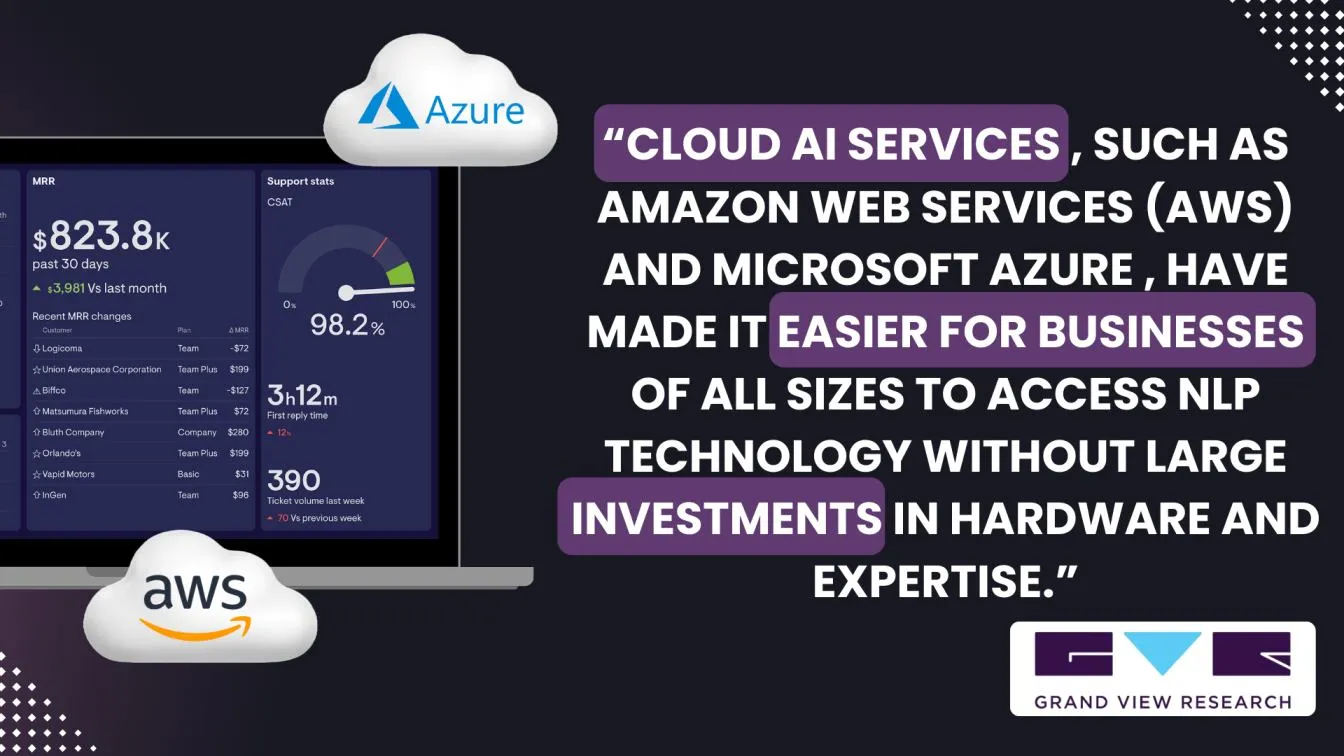
Imagine running complex AI tests without worrying about server maintenance, hardware limitations, or geographical barriers. Cloud-based AI platforms not only democratize access to powerful AI tools but also enable real-time collaboration across the globe. 🌐✨ For testing AI algorithms, performing load tests, training machine learning models, or leveraging deep learning techniques, the cloud transforms testing from a headache into a seamless, scalable process.
Let’s explore the role of cloud-based solutions in AI testing through this comparison table.
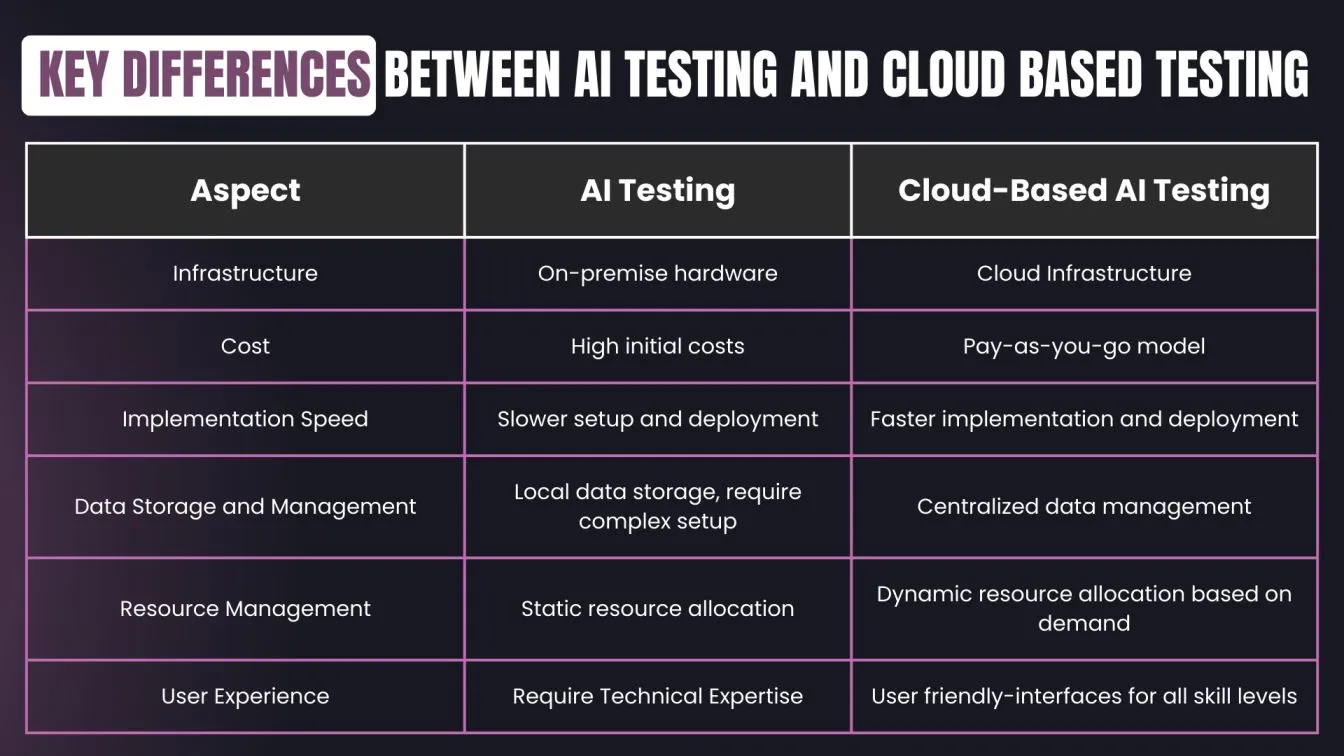
How Cloud-Based Solutions Work for AI Testing?
Cloud-based solutions have become the backbone of modern AI testing, making it faster, more scalable, and incredibly efficient.
In this section of our blog, we’ll explore how cloud platforms elevate AI testing. Let’s dive into the transformative ways cloud technology is shaping the future of AI-driven testing! 💡🚀
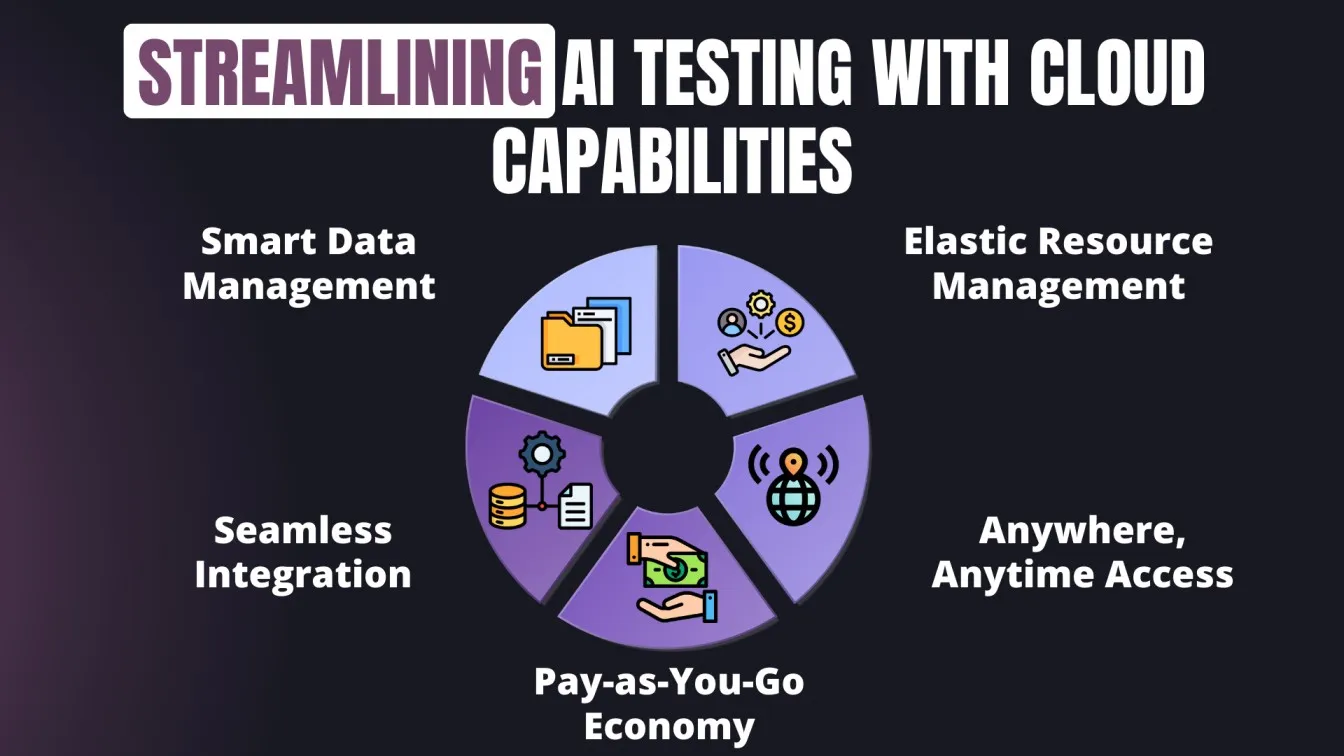
- Elastic Resource Management:
Think of cloud resources as an elastic band that stretches to fit your needs. When you need more testing power, the cloud expands to provide it; when you need less, it contracts.- Real- AWS Auto Scaling automatically adjusts the number of active instances based on the testing load, ensuring optimal performance and cost efficiency.
- Anywhere, Anytime Access:
Imagine having a key that opens your testing environment from anywhere in the world. Cloud-based solutions make this possible, allowing seamless access no matter where your team is located.- Google Cloud’s AI Platform enables teams to collaborate on AI model development and testing from any location, enhancing global cooperation and flexibility.
- Pay-as-You-Go Economy:
Picture a utility bill that charges you only for the power you use. Cloud services operate on a similar principle, reducing upfront costs and providing flexibility that is particularly beneficial for financial services by allowing you to scale resources based on your testing needs.- Microsoft Azure’s Machine Learning service provides a pay-as-you-go model, reducing costs by allowing you to scale resources based on your testing needs.
- Seamless Integration:
Visualize a well-connected hub where all your tools work together effortlessly. Cloud solutions integrate with existing development and testing tools, creating a cohesive testing environment.- IBM Cloud’s Watson integrates with CI/CD tools to streamline the AI testing workflow, enhancing productivity and consistency.
- Smart Data Management:
Imagine a high-tech filing cabinet that organizes and retrieves your data efficiently. Cloud platforms offer sophisticated data management solutions, ensuring your test data is well-organized and accessible.- Snowflake provides advanced data warehousing solutions that manage vast amounts of data, enabling quick analysis and reporting
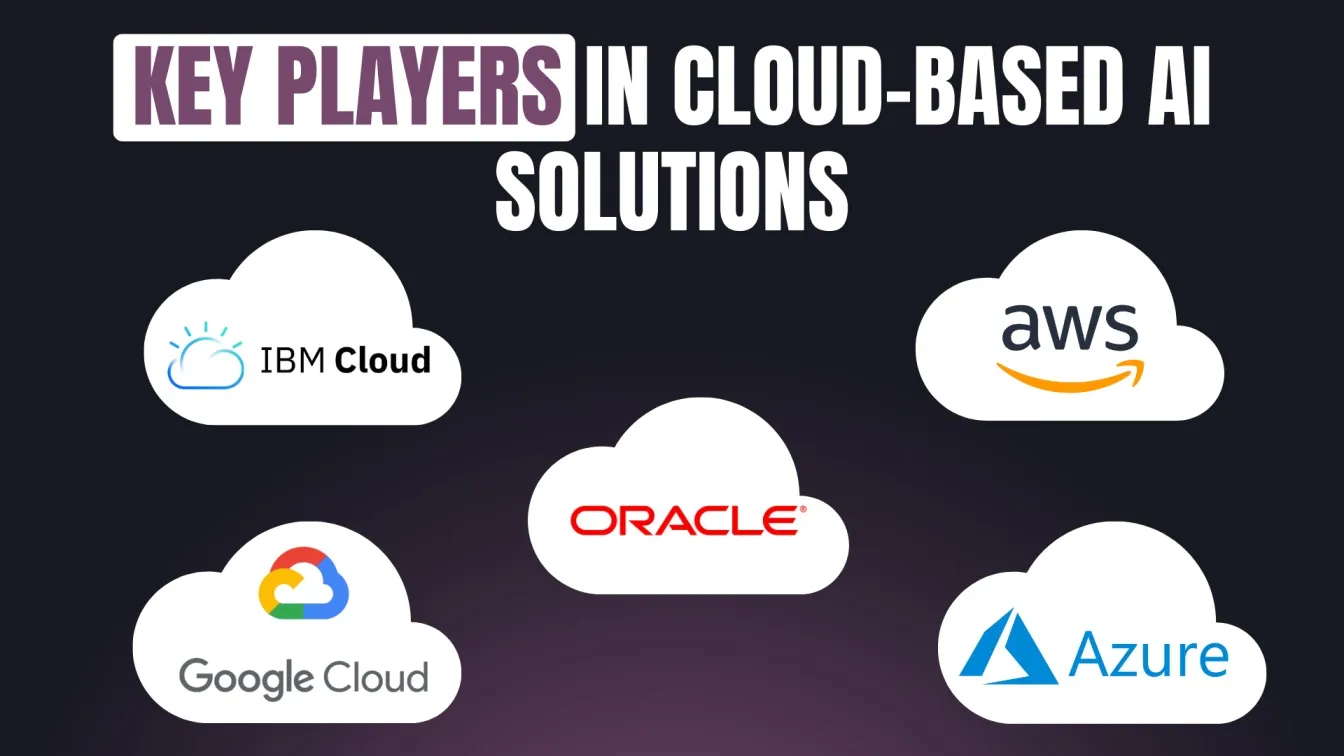
Advantages of using the cloud for AI-powered testing
As organizations increasingly adopt AI for testing, cloud-based solutions emerge as game-changers. They not only enhance the testing process but also provide numerous benefits that can significantly improve efficiency, collaboration, and cost-effectiveness.
Here are the key advantages that make cloud solutions indispensable for AI-powered testing!
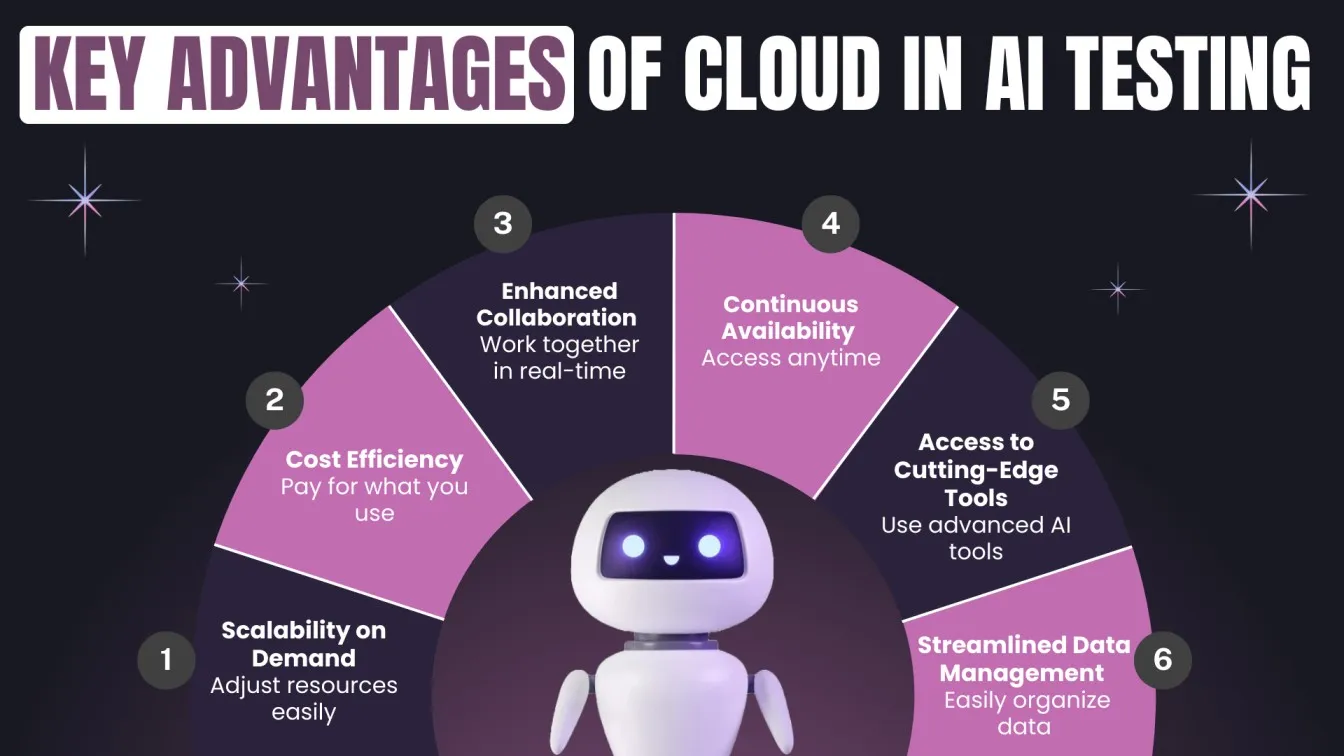
Democratization of AI Testing
Software development is undergoing a transformation as AI testing becomes accessible to everyone, not just large enterprises. This democratization process is about breaking down barriers, inviting innovation, and empowering creators from all backgrounds.
The Concept of Democratizing AI Testing
Democratizing AI testing means unlocking access to advanced tools and technologies that were once exclusive to large corporations. Imagine a vibrant marketplace filled with diverse voices and innovative ideas - this is the spirit of inclusivity that drives the movement.
It's not just about technology; it’s a cultural shift that empowers individual customers and small startups to turn their software dreams into reality. By breaking down barriers, we create an environment where creativity flourishes, allowing fresh talent to emerge and collaborate.
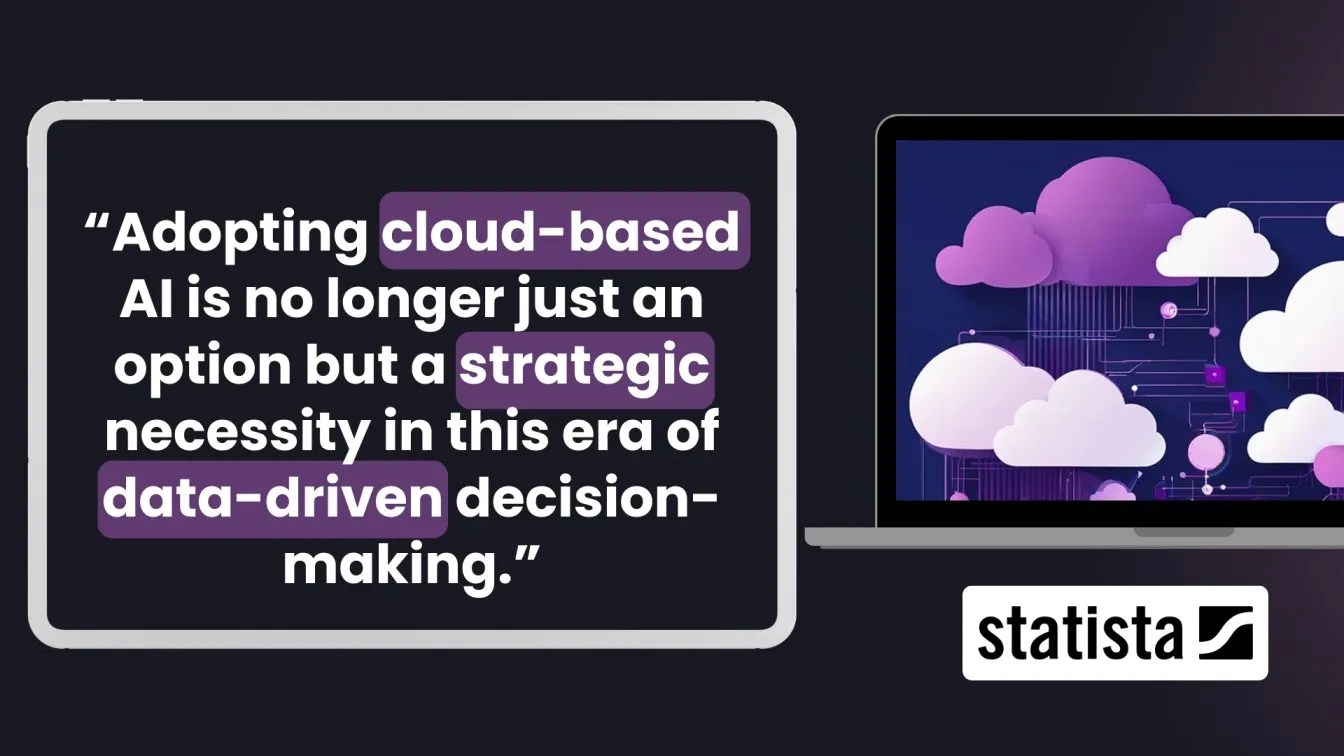
How Cloud-Based Tools Make AI Testing Accessible to Small Businesses and Individual Developers?
Cloud-based tools provide a straightforward pathway for small businesses and individual developers to access AI testing capabilities. For business owners, this means they can enhance their business operations without needing extensive resources, making AI testing an achievable goal for everyone.
Let’s explore how these cloud-based solutions democratize AI testing, transforming it from a luxury for the big players into an accessible opportunity for all. Here’s a simple step-by-step guide to getting started:
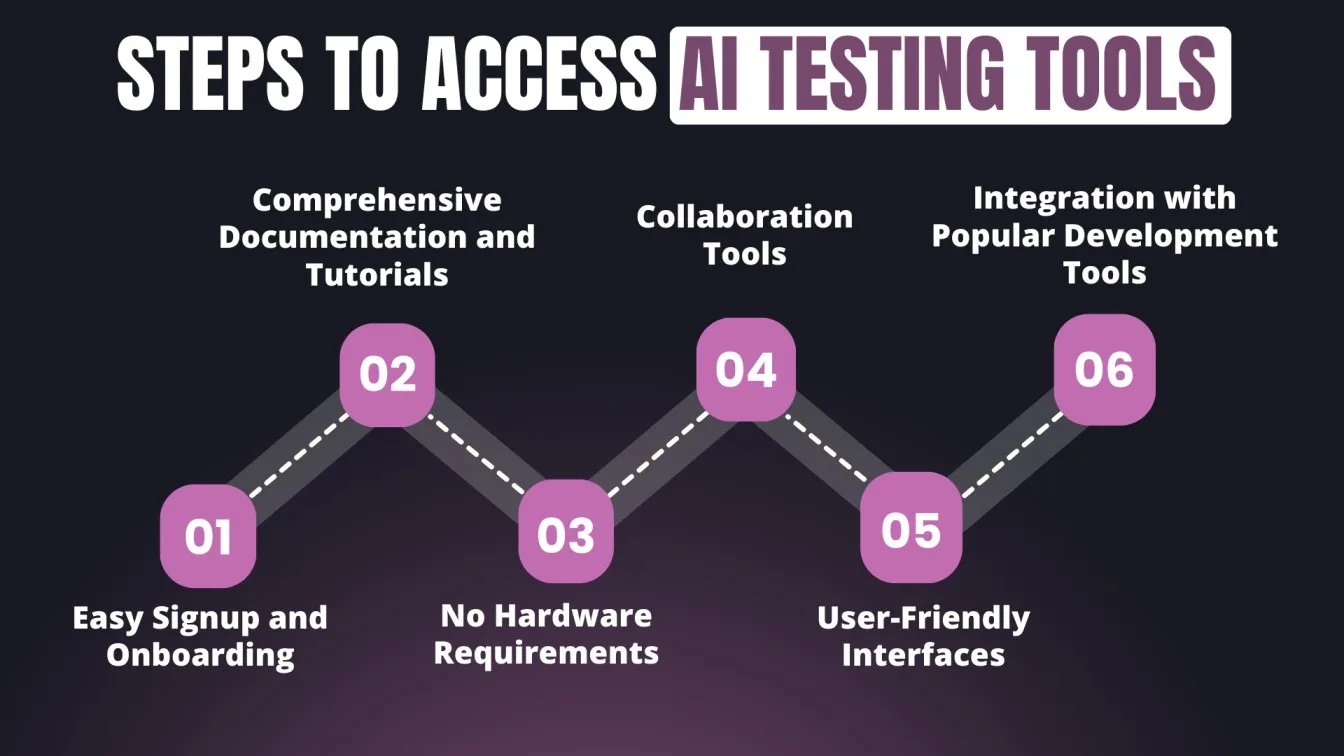
Let's explore each step in detail to understand how cloud-based tools can empower small businesses and individual developers in their AI testing efforts:
- Easy Signup and Onboarding 📝
- Quick Registration: Most cloud platforms require only a simple signup process. Users can start with free tiers or trials to explore the tools without commitment.
- Quick Registration: Most cloud platforms require only a simple signup process. Users can start with free tiers or trials to explore the tools without commitment.
- Comprehensive Documentation and Tutorials 📚
- Guided Resources: Cloud providers often offer extensive documentation, tutorials, and community forums to help users get started.
- Guided Resources: Cloud providers often offer extensive documentation, tutorials, and community forums to help users get started.
- No Hardware Requirements ⚙️
- Elimination of Infrastructure Costs: Since all the processing happens in the cloud, developers don’t need to invest in expensive hardware. They can access powerful computing resources from any device with internet connectivity.
- Elimination of Infrastructure Costs: Since all the processing happens in the cloud, developers don’t need to invest in expensive hardware. They can access powerful computing resources from any device with internet connectivity.
- Collaboration Tools 🤝
- Team Integration: Many cloud platforms include collaboration features that allow teams to share resources, tools, and results easily. This accessibility fosters teamwork, even among remote members.
- Team Integration: Many cloud platforms include collaboration features that allow teams to share resources, tools, and results easily. This accessibility fosters teamwork, even among remote members.
- User-Friendly Interfaces 🖥️
- Intuitive Design: Many cloud tools are designed with non-technical users in mind, featuring drag-and-drop interfaces and simple dashboards that make it easy to set up and manage AI testing processes.
- Intuitive Design: Many cloud tools are designed with non-technical users in mind, featuring drag-and-drop interfaces and simple dashboards that make it easy to set up and manage AI testing processes.
- Integration with Popular Development Tools 🔗
- Streamlined Workflows: Cloud-based AI testing tools often integrate with widely-used development environments, making it easy for developers to incorporate testing into their existing workflows.
- Streamlined Workflows: Cloud-based AI testing tools often integrate with widely-used development environments, making it easy for developers to incorporate testing into their existing workflows.
The Importance of making AI Tools available to a Wider Audience
The importance of making AI tools accessible to a broader range of users lies in democratizing technology, fostering innovation, and increasing inclusivity. By expanding access, AI empowers more individuals, businesses, and industries to leverage artificial intelligence for automation, data analysis, and problem-solving.
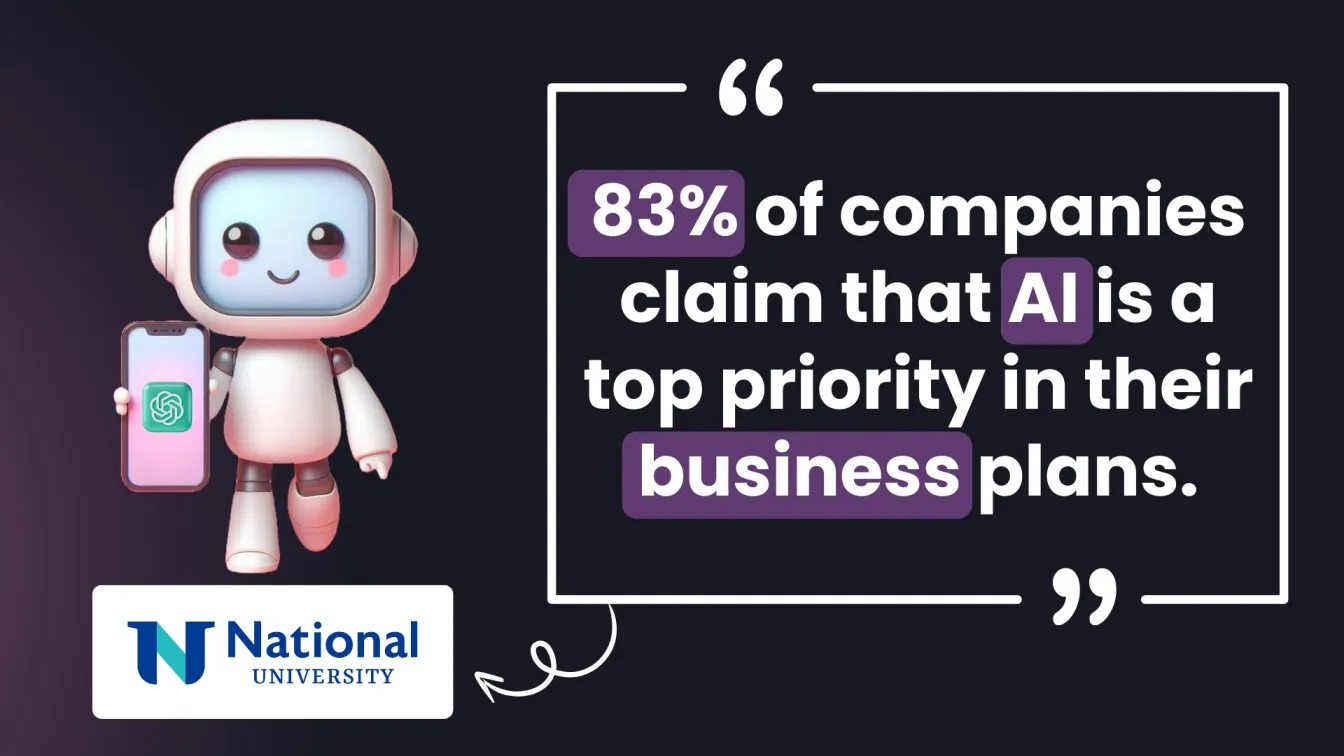
When AI tools are accessible to a broader audience, it drives diversity in thought, leading to more inclusive and innovative solutions. It enables smaller companies, independent developers, and even non-technical users to utilize cutting-edge technologies once reserved for large corporations.
🌍 Innovation at Every Corner
Opening up AI to smaller businesses and solo developers unlocks fresh, groundbreaking ideas. It’s like a creative playground where diverse perspectives drive unexpected advancements, pushing AI technology forward in unique ways.
👩💻 Bridging the Knowledge Divide
AI doesn’t have to be complex! With user-friendly tools, non-experts can experiment and solve real-world problems, no advanced degree is required. This lowers the barrier for talented creators everywhere, bringing more voices into the AI conversation.
⚖️ Leveling the Competitive Field
AI was once only affordable to tech giants, but now cloud services enable startups and small businesses to harness the same AI power. This levels the competitive landscape, encouraging rapid innovation across industries.
🤝 Collaboration Across the Spectrum
Wider access to AI tools fosters collaboration among small businesses, researchers, and developers. A dynamic community emerges, where knowledge and breakthroughs are shared, accelerating progress for all.
🌟 Driving Social Change
From education to healthcare, democratizing AI allows smaller, socially focused teams to tackle global challenges. These teams can create real solutions for real people, making a tangible impact where it matters most.
The Future of Cloud-Based AI Testing
As we look ahead, the landscape of cloud-based AI testing is evolving rapidly. Several emerging trends and innovations are set to reshape how we approach software testing, enhancing efficiency and collaboration.

Below are some key developments that are expected to play a pivotal role in the future of AI testing, driving automation, scalability, and a more collaborative environment.
1. Intelligent Test Automation 🤖
Imagine a world where testing is not just automated but intelligent! Future frameworks will autonomously identify, prioritize, and execute test cases, learning from historical data and user behavior. This means faster cycles and fewer human errors—truly revolutionary!
2. Collaborative DevOps Culture 🌍
Picture a vibrant DevOps ecosystem where everyone shares the responsibility for quality. Cloud-based AI testing will seamlessly integrate into CI/CD pipelines, providing real-time feedback and fostering collaboration between development and testing teams.
3. Dynamic Scalability ☁️
Think of testing environments that expand and contract like elastic. Future cloud solutions will utilize microservices architecture, allowing teams to scale resources as needed, optimizing both performance and costs.
4. Predictive Analytics and Insights 📈
What if you could foresee vulnerabilities before they become issues? AI will empower testing tools with predictive analytics, offering insights that help teams focus on risk management, enhancing software reliability.
5. Robust Security Protocols 🔒
As applications grow more complex, security will take center stage. Cloud-based AI testing will integrate advanced protocols to detect anomalies in real-time, ensuring your software is not just functional but also secure.
6. User-Centric AI Models 👥
Imagine AI models that learn directly from user interactions. The future will focus on user-centric testing strategies, tailoring software to meet real user needs and enhancing overall experience.
7. Ethical AI Testing Practices ⚖️
With rising ethical concerns about bias in AI, testing practices will be paramount. Future frameworks will ensure that AI algorithms are tested for fairness and transparency, building trust in these technologies.
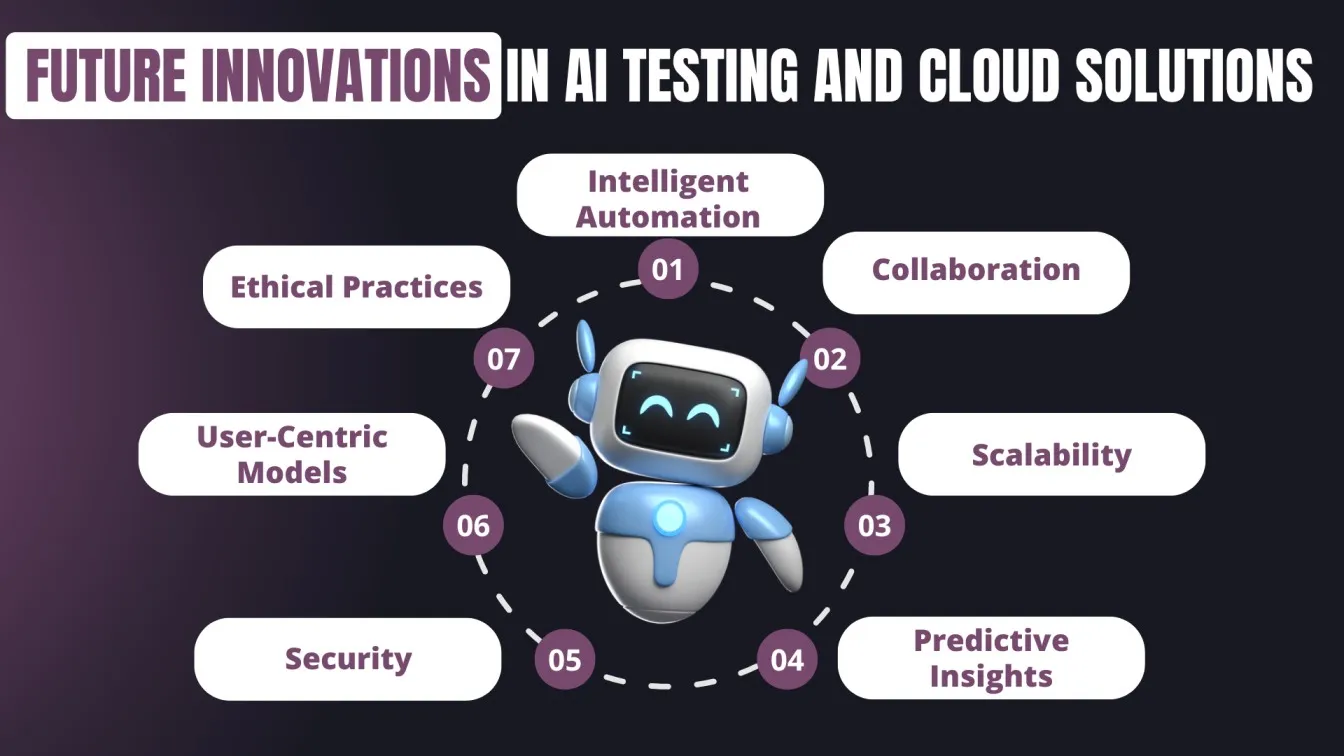
Conclusion
The integration of cloud-based AI solutions in testing is transforming the software evaluation landscape, making advanced technologies more accessible. Google Cloud Platform (GCP) offers a range of pre-built models that simplify the incorporation of AI into applications, allowing developers to utilize machine learning capabilities without requiring extensive coding knowledge. With tools for various use cases, from implementing voice assistants to analyzing medical images, GCP enables businesses to harness advanced AI tools swiftly and effectively. By utilizing open-source tools and application programming interfaces, developers can streamline the development process, accelerating model building and deployment. This democratization of AI empowers small businesses and individual developers to access cutting-edge technology, driving innovation and enhancing customer experiences across different sectors.
By leveraging GCP's pre-built models and machine learning capabilities, companies can deliver more personalized solutions that improve customer satisfaction. The platform supports rapid AI adoption by providing resources that facilitate intelligent automation and predictive analytics. For instance, incorporating voice assistants into customer service operations or deploying deep learning models to interpret medical images can significantly improve outcomes. The combination of open-source tools, APIs, and sophisticated AI technology in the model-building process simplifies AI integration, making it easier for teams to innovate continuously and optimize their services to enhance customer experiences and meet evolving needs.
People also asked
👉 What is an example of democratization of technology?
An example of democratization of technology is GitHub Copilot, which uses AI to assist developers in writing code more efficiently. It makes advanced coding tools accessible to users of all skill levels.
👉 What types of testing can be automated using AI in the cloud?
AI in the cloud can automate various testing types, including functional testing, performance testing, regression testing, and visual testing, among others.
👉 What are the benefits of cloud-based AI testing?
Cloud-based AI testing offers advantages like cost efficiency, scalability, easier collaboration, and faster deployment, making it accessible for businesses of all sizes.
👉 How is cloud computing is used in artificial intelligence?
Cloud computing enables AI by providing scalable resources for processing and storing large datasets. It allows AI models and services to be deployed and accessed on-demand, improving efficiency and flexibility.



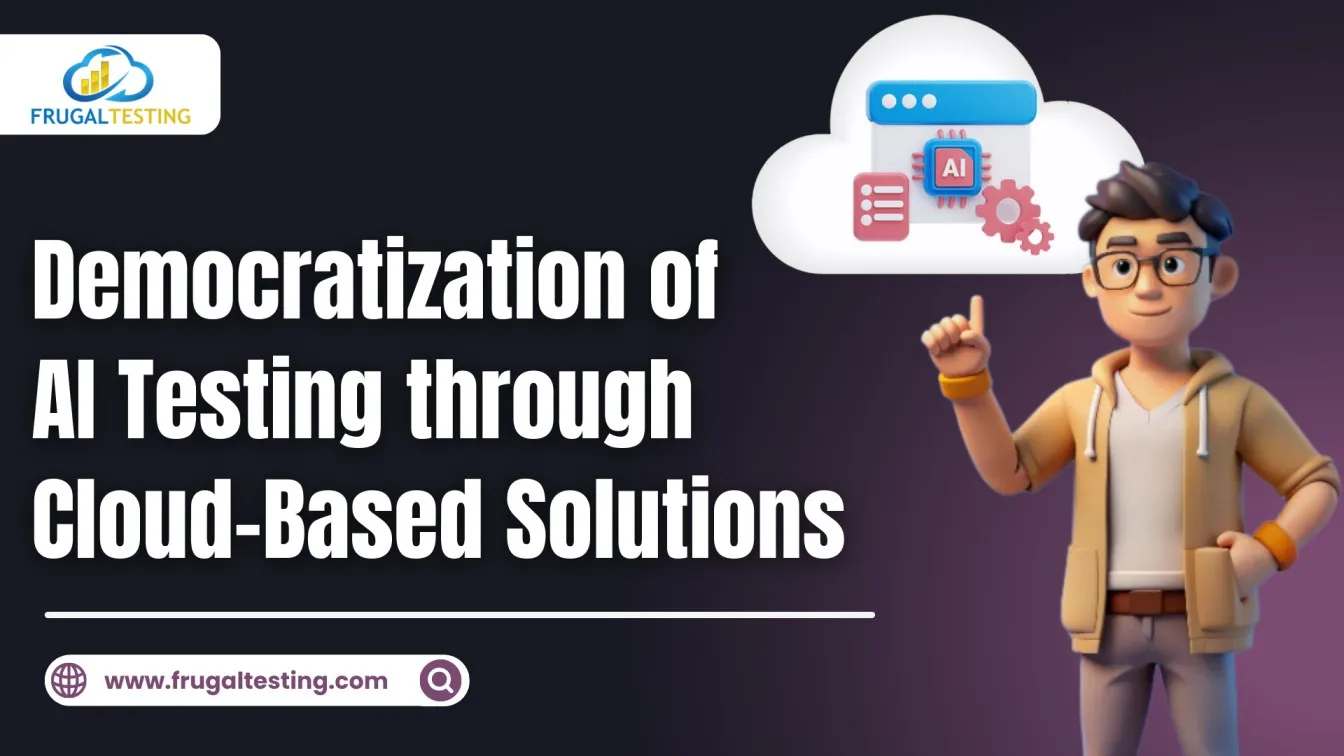
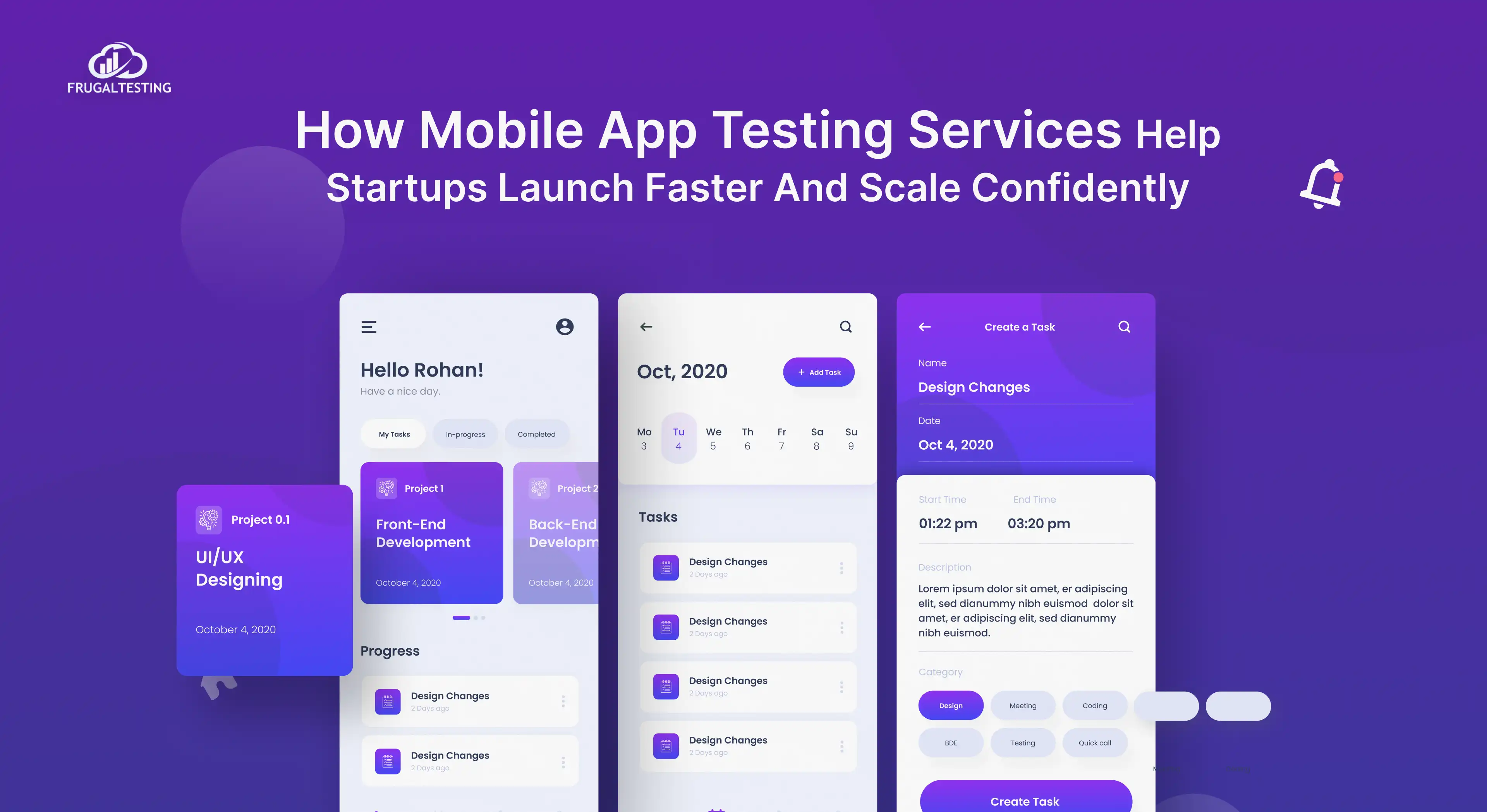
%201.webp)

